

Adjective Declensions - German for English SpeakersGerman for English Speakers. German adjectives work just like English ones, except that they take on case endings when they come right before a noun: Der Hund ist groß und braun.The dog is big and brown.
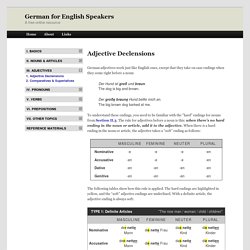
Der große braune Hund bellte mich an.The big brown dog barked at me. To understand these endings, you need to be familiar with the "hard" endings for nouns from Section II.3. The rule for adjectives before a noun is this: when there’s no hard ending in the noun or article, add it to the adjective. When there is a hard ending in the noun or article, the adjective takes a “soft” ending as follows: The following tables show how this rule is applied. Diminutive Endings - German for English SpeakersGerman for English Speakers. Diminutive noun endings in German are used for a smaller version of something, or just to communicate cuteness, informality or affection.
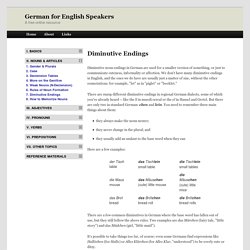
We don't have many diminutive endings in English, and the ones we do have are usually just a matter of size, without the other connotations: for example, "let" as in "piglet" or "booklet. " There are many different diminutive endings in regional German dialects, some of which you've already heard -- like the li in muesli cereal or the el in Hansel and Gretel. But there are only two in standard German: chen and lein. You need to remember three main things about them: they always make the noun neuter;they never change in the plural; andthey usually add an umlaut to the base word when they can Here are a few examples: There are a few common diminutives in German where the base word has fallen out of use, but they still follow the above rules. Informació general. German for Beginners: Lektion 10 (Part 2) German for Beginners Lektion 10 - Wie komme ich dorthin?
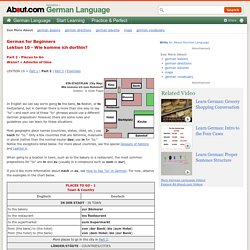
Part 2 - Places to GoWann? • Adverbs of time. Free German Lessons A1. The free German lessons by TREFFPUNKT Language Institute Would you like to know how learning German works?
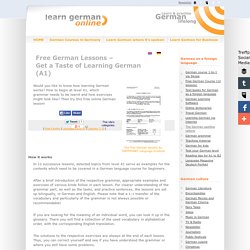
How to begin at level A1, which grammar needs to be learnt and how exercises might look like? Then try this free online German lesson! How it works In 12 successive lessons, selected topics from level A1 serve as examples for the contents which need to be covered in a German language course for beginners. After a brief introduction of the respective grammar, appropriate examples and exercises of various kinds follow in each lesson. German grammar exercises for free. - explanations - exercises - resources - German class at Sprachinstitut TREFFPUNKT "Deutsche Sprache - schwere Sprache" (German language - difficult language): This traditional saying could be often heard when someone has particularly hard times with the German grammar.
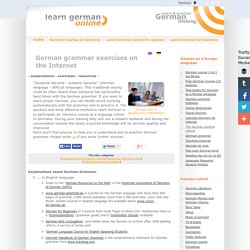
If you want to learn proper German, you can hardly avoid working systematically with the grammar and to practice it. The quickest and most effective method to learn German is to participate an intensive course at a language school in Germany. During your training they will uns a modern textbook and during the conversation lessons the newly acquired knowledge will be directly applied and improved. Arbeitsblätter. Th1Lek1.pdf. Themen aktuell.
Materialien zu Themen aktuell Band 1 und 2. German adjective endings. The famous writer Mark Twain already used to make fun of the phenomenon of German adjective endings.

Please keep reading, if you do not want to become just as desperate about it as he was ... Every time I had to teach the German adjective endings I was really happy that I already learned it as a child just by heart; so, today I "just know" how it works. This topic is one of the most difficult of the basic German grammar, and I have never known a student who hasn't struggled with it. I'm not surprised! Very often we, teachers, give our students simply 3 or 4 tables, which they have to learn by heart. At the beginning of the intermediate level, it can happen that the textbooks simply provide 3 or 4 tables “to remind”. German declension. German declension is the paradigm that German uses to define all the ways articles, adjectives and sometimes nouns can change their form to reflect their role in the sentence: subject, object, etc.
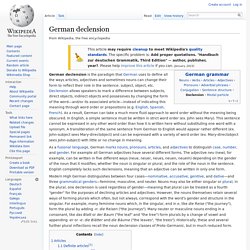
Declension allows speakers to mark a difference between subjects, direct objects, indirect objects and possessives by changing the form of the word—and/or its associated article—instead of indicating this meaning through word order or prepositions (e.g. English, Spanish, French). As a result, German can take a much more fluid approach to word order without the meaning being obscured. In English, a simple sentence must be written in strict word order (ex. John sees Mary). German Podcasts. Sort by Titles Per Page.

11 Awesome German Podcasts to Accelerate Your Language Learning. Oh, man.
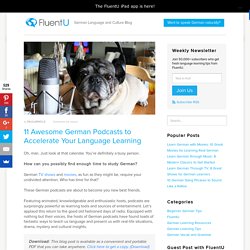
Just look at that calendar. You’re definitely a busy person. German Expressions. German Pronouns. A pronoun in German as well as in English is like a shortcut to refer to a noun, a word that stands for or represents a noun or noun phrase, a pronoun is identified only in the context of the sentence in which it is used.
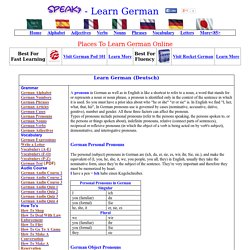
So you must have a prior idea about who "he or she" "er or sie" is. In English we find "I, her, what, that, his", In German pronouns use is governed by cases (nominative, accusative, dative, genitive), number and gender. All these three factors can affect the pronoun. Types of pronouns include personal pronouns (refer to the persons speaking, the persons spoken to, or the persons or things spoken about), indefinite pronouns, relative (connect parts of sentences), reciprocal or reflexive pronouns (in which the object of a verb is being acted on by verb's subject), demonstrative, and interrogative pronouns.
Prepositions. Summary Chart Note: As in English, the meanings of the prepositions in German are quite flexible, and very important to know, since these little words come up all the time. As a result, it is difficult to give English equivalents for a list like this. The compromise used below is to give their primary meanings, and to write "etc. " where other meanings occur particularly often. Try the second of the "Practice Exercises" on this page (Wie sagt man...?) In order to get a feel for how these prepositions can be used in various contexts. Übungen. How to Say 'to' in German - 'nach' vs. 'zu' How to say "to" in Germannach vs. zu There are at least half a dozen ways to say "to" in German. But one of the biggest sources of "to" confusion comes from just two prepositions: nach and zu.
Fortunately, there are clear distinctions between the two. We point out some helpfulGerman grammar books onthe next page of this article. The preposition nach, except in the idiomatic phrase "nach Hause" ([to] home, homeward), is used exclusively with geographic place names and points of the compass (including left and right). Here are some examples of nach when it means "to": nach Berlin (to Berlin), nach rechts (to the right), nach Österreich (to Austria). Handout: Nominative, Accusative, and Dative: When to Use Them. Microsoft Word - Lektion 8 Präpositonen.docx - lektion8_a1.pdf. Basic Chart. Präpositionen und Fälle – Deutsche Grammatik. German/Grammar/Pronouns. Note: The possessive is not a case of the personal pronoun, rather it's a pronoun itself.
This table shows the possessive pronoun's stem, which is declined as an ein-word (like the indefinite article). The genitive case indicates possession or association, and is equivalent to, and replaces, the English word "of". List of lessons of the Deutsch Interaktiv online German language course of Deutsche Welle (levels A1-A2-B1) Abu Dhabi - Practice your German online: Material for levels A1-A2 - Goethe-Institut. List of lessons of the Deutsch Interaktiv online German language course of Deutsche Welle (levels A1-A2-B1) Basic German Vocabulary - Zertifikat Deutsch and Deutsch-Test für Zuwanderer (A1, A2, B1) Abu Dhabi - Practice your German online: Material for levels A1-A2 - Goethe-Institut.
A-Level - Topics - A2 Music - Goethe-Institut Start Deutsch 2 Modellsatz. German examinations - Materials - Goethe-Institut Curricula A1/A2. German examinations - Goethe-Zertifikat A1: Start Deutsch 1 - Practice material and information - Goethe-Institut Case in German. Aus from Ich komme aus den Vereinigten Staaten. I come from the United States. Ihre Jacke ist aus grüner Seide. Her jacket is made of green silk. außer except for, besides Außer ihm denken wir alle so. Except for him, we all think so. bei with, near, at, at the home of Die Party ist bei mir. Mit with, by Kommst du mit uns? Gcse-revision, german, grammar, basic-essentials. Gcse-revision, german, grammar, basic-essentials, articles-change-depending-case. GCSE Bitesize: Adjective endings reference tables. Die konjugation des Verbs sein - konjugieren sein. Das Verb sein ist ein HilfsverbDas Verb sein wird mit dem Hilfsverb sein konjugiertsein Indikativ ich bindu bister/sie/es istwir sindihr seidsie/Sie sind ich wardu warster/sie/es warwir warenihr wartsie/Sie waren ich bin gewesendu bist gewesener/sie/es ist gewesenwir sind gewesenihr seid gewesensie/Sie sind gewesen ich war gewesendu warst gewesener/sie/es war gewesenwir waren gewesenihr wart gewesensie/Sie waren gewesen ich werde seindu wirst seiner/sie/es wird seinwir werden seinihr werdet seinsie/Sie werden sein.
Prepositions - online grammar exercises. This next set of exercises will help you properly learn and practice German prepositions. In particular, you will learn and practice prepositions of place and the use of the prepositions "aus", "von", "nach" and "zu". Wort der Woche: The German conjunction als - The German Professor. The conjunction als is the 25th most common word in German. Simply put, a conjunction is a word that joins together sentences, clauses, phrases, or words. Many conjunctions have a very specific conjoining role, such as joining a dependent and independent clause. Als, on the other hand, is used to join together many different parts of speech.
And in its different roles, it can take on different meanings. Let’s explore what these functions and meanings are and how to identify them. Meaning and usage of als (1) when, while (subordinating conjunction; used with an indicative past tense) In this usage, als begins a dependent clause that has its own subject and verb. Wir haben dich angerufen, als wir in Berlin ankamen. Als ich aus dem Zug ausstieg, hat es stark geregnet. Conjunctions in German. Coordinate, subordinate and compound conjunctions. 50 Common German Verbs with Sample Sentences. Top 20 Most-Used German Verbs - Conjugations. German for Beginners: Occupations - Was sind Sie von Beruf? - Lesson 14. Was sind Sie von Beruf? What’s your occupation? This lesson introduces: (1) vocabulary related to occupations and trades, (2) expressions related to that vocabulary and (3) the grammar of accusative prepositions.
A recommended review for this lesson is Part 2 of Lesson 11 (accusative case). Print this page (without ads) Slow German - Lerne alles über Deutschland! Kultur - Literatur, Film, Kunst und Musik. Herder-Gymnasium in Berlin: Die Freuden der Mathematik - Schule. 25.11.2014 15:09 Uhrvon Katharina Ludwig. Nachrichten.